-
Popular Myths About Mobile App Development
- Myth 1: An Idea is All You Need
- Myth 2: Mobile App Development is all About Coding
- Myth 3: You Can Develop the First Mobile App Version With Ease
- Myth 4: App Store Optimization Effort Will Do The Trick
- Myth 5: Customers Will Regularly Use the App After Downloading
- Myth 6: Finest Graphics Receive the Highest Rating
- Myth 7: There is no Need to Market an App
- Myth 8: Mobile App Marketing Is Always Costly
- Myth 9: Websites Offer an Improved Experience in Comparison to Mobile Apps
- Myth 10: Mobile App Analytics Precisely Shows the App’s Performance
- Myth 11: More Features, Better the App
- Myth 12: You Can Create a Successful Cross-Platform App in One Go
- Myth 13: Building an Enterprise App is a Long and Complex Procedure
- Myth 14. The Work is Done Once the App is Developed
- Myth 15. Developing a Mobile App is Expensive
- Myth 16. You can Easily Find an App Development Company
- Quick Recap of the Top Myths of Mobile App Development
-

- The Right Way To Develop A Mobile App

Mobile apps are the need of the hour, and after all, we need something to feed billions of smartphones, which can’t survive without the apps. Be it a business or an individual idea, mobile apps can bring quick success. They connect clients with your products or services offered through an app.
Mobile apps must be considered as an enterprise-wide strategy, but the mobile app development process is treated as a standalone project. But many people get stuck even before trying their hands on a mobile app because several myths are making the rounds in the app industry and very little information is available about the topic. In turn, these common mobile app development myths de-motivate businesses from building their mobile apps. And even if they do, they do it without proper research, thus seeing failure.
To clear the air around the process of mobile app development and its related operations, check out these myths and know what exactly gets cooked in the coding world.

Popular Myths About Mobile App Development
Many of the common mobile app development myths mentioned in this article have been lingering on for eternity, which may hinder you from getting started with the app development process. Therefore, stay clear of all the uncertainty and get ready to develop your first mobile app.
Myth 1: An Idea is All You Need
There is always an excellent idea behind a successful business, and mobile app development is no different. If you are up to get your first app developed, make sure to carve out a unique and feasible idea that can be scalable and practical enough to be implemented in line with the mobile app development trends.
Every year, many people come up with fantastic app ideas in the various app growth conferences, but at the end of the year, only a handful of them are able to make through the other side of the tunnel.
Also, the idea should closely resonate with the mobile app budget because, with different types of app, the budget fluctuates and budgeting mistakes are common in the app development process. So, make sure to bridge the gap between app idea and budget.
Myth 2: Mobile App Development is all About Coding
It’s one of the top myths regarding app development. Some people think that mobile app development is all about writing codes; however, it is beyond that. Coding is a basic need to build Android and iOS apps, but many other factors go into the making of a decent app, which includes graphics, user experience, high efficiency, and many years of experience.
Also, the developers should be aware of the latest mobile app marketing trends, technology, hardware advancements, and updated tactics. To make it perfect, there is a requirement of different kinds of toolkits, languages, data sources and backend systems as every single case is different.
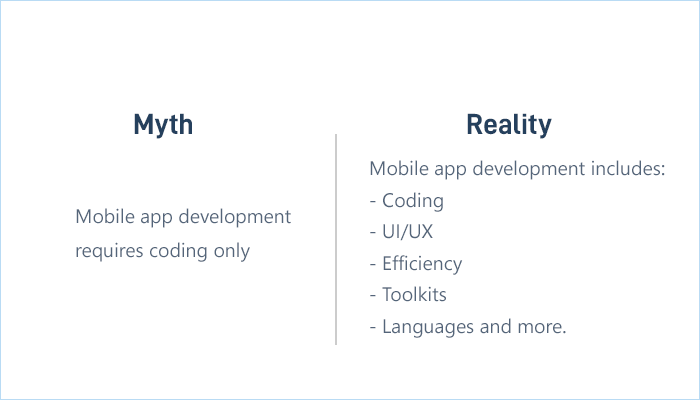
Mobility is not just regarding app building; it needs a focused effort and a broader mobility technique to provide top-notch solutions. Nevertheless, supporting different OS versions in the mobile space becomes different for the developers. This is why developers prefer cloud-based mobile app platforms.
Coding and top-notch teamwork are required to bring stakeholders like business and project managers, in-house IT experts, developers, and management representatives on the same page and ensure that the entire app building procedure is done precisely.
Myth 3: You Can Develop the First Mobile App Version With Ease
With robust mobile app development frameworks and tools in hand, many of you must have this notion in mind that building an app is a simple juggling of the codes, but that’s not the case.
The complete process of mobile app development involves multiple stages like blueprint creation, UI/UX design, features listing, coding for various platforms, beta testing, and more. Hence, with all these elements, it can even take a year to develop a well-performing app.
Also, the scalability and app requirements play a significant role in deciding the overall complexity of the mobile app.
Myth 4: App Store Optimization Effort Will Do The Trick
Right after the app development, the app is all set to be listed in the app stores and to get a better ranking, the best practices of the app store optimization should be followed. Technically, it will rank your app on top of the list.
Interestingly, there is much more than blindly following the app store optimization. The way you display your app to the audience and how much your app relates to the description of the app are also equally crucial for a better ranking.
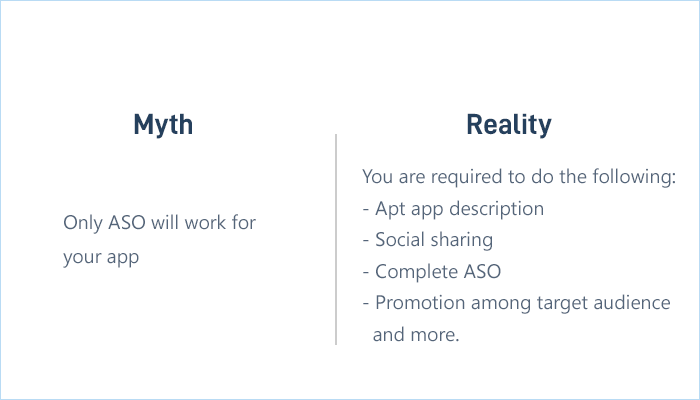
Most importantly, ASO helps the app to rank in the app store, but until the people are not aware of the app, it will be of no use. Thus, it does matter what all strategies you implement for its promotion and the reach it gets.
Myth 5: Customers Will Regularly Use the App After Downloading
If the app has only a few active users, it doesn’t matter even if millions of people download the application. For its success, the app users have to visit the app regularly.
For instance, people install many apps on their mobile devices, but they use only a few apps daily, and other apps remain inactive. So, the inactive apps are many other apps that are not downloaded.
As a result, if the users don’t use the app regularly after downloading it, it won’t become a hit.
Myth 6: Finest Graphics Receive the Highest Rating
The finest quality graphics indeed are one of the keys to success during app building, but it doesn’t assure downloads. Many things are responsible for a mobile application’s success - incorporating precise performance, simplicity, user experience, etc.
Only after integrating these elements, you can expect to earn a decent user rating on the app stores.
Below are significant factors that make an app likely to be rated better -
- Easy-to-Use Navigation: Users prefer apps that offer easy navigation; they don’t check whether it’s an e-commerce app or something else. They like apps that can be used easily and don’t include tricky designs.
- User Interface: Mobile user interface design requirements are not the same as desktop computers. A mobile’s touch screen feature and tiny screen size are specific considerations in UI to ensure readability, consistency, and usability.
- User Experience: If you want to enhance client satisfaction and reliability by improving ease of use and usability, go for a rich UX process.
Therefore, it is evident that not just the app’s graphics, but also the UI and UX have a vital role in making your app development a hit.
Myth 7: There is no Need to Market an App
If you own app business, building a great looking and well-designed app doesn’t end your responsibility. Technically, you may have a flawless product, but if nobody knows about it except your team members, there is no use of it.
Combine marketing tactics to use different channels. Without applying marketing tactics for mobile apps, you cannot achieve marketing success.
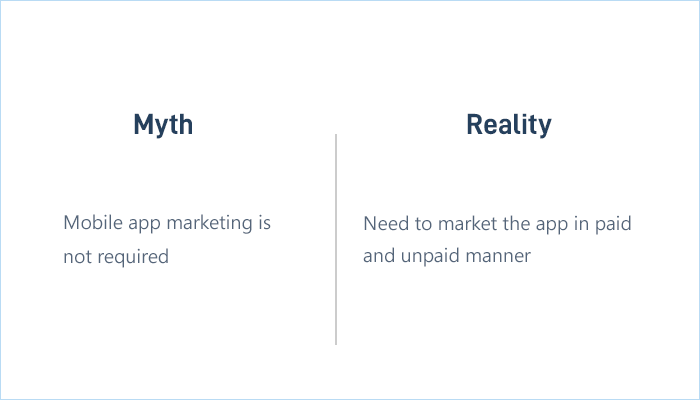
For marketing your app, you can consider the following steps:
- Write about the product;
- Set up automated marketing;
- Write case studies and source testimonials;
- Know your unique value proposition (UVP);
- Optimize the app’s product page
- Invest in building an attractive icon;
- Marketing for retention and upsells.
Though many other factors can help you market the app. Learn about the latest mobile app marketing trends here.
Myth 8: Mobile App Marketing Is Always Costly
Every business needs a smartly devised marketing plan that can go well with the trends in mobile apps, and with so many platforms in the market, the cost of marketing tends to swell. But if the marketing is done on the right platforms with the right frequency, the overall cost of marketing can come down considerably.
There are various platforms where unpaid marketing can do wonders; therefore, it’s crucial to know well in advance what to brandish and where to market.
Following are some famous mobile marketing automation platforms:
- Swrve
- Braze
- Amplitude
- Localytics
- CleverTap
Make sure to cover social media, review marketing, email, and other components while drafting the mobile app marketing strategy. At last, it’s about smart investments and returns.
Myth 9: Websites Offer an Improved Experience in Comparison to Mobile Apps
It’s 2019, and many people still believe that websites provide a better experience in comparison with mobile apps. Nevertheless, statistics show something else, and it’s one of the most believed myths about app development.
As per a report, back in 2016, every third person in the world was a mobile user. And by the end of this year, 2019, the percentage is anticipated to jump by 67% of the total population of the world.
Mobile app users saw 286% more products online than mobile web shoppers. Moreover, the whole conversion rate is approx 120% higher on apps. This myth about mobile app development is drawn because it’s challenging to compete with numbers.
Myth 10: Mobile App Analytics Precisely Shows the App’s Performance
You can definitely measure an app’s functionality with the help of mobile app analytics tools quite efficiently. But the buck doesn’t stop here. There are other aspects also, which can put more light on the app’s performance.
To gauge the complete app performance even better, consider these factors:
- Gauge and compare your app’s functionality on diverse screens;
- Locate the tricky involvements;
- Recognize the screen at which all users leave the application;
- Search for screens with minimum involvement.
Myth 11: More Features, Better the App
Considering mobile apps as a mini version of your website is one of the most followed myths of mobile app development. Some developers prefer to stuff more features into the app when they want their app to offer a focused and particular performance to their target audience.
If you think that you can get success with the mobile app in just one shot, you will end up with memory hogs, slower performance, and bloated app. You can opt for high-quality graphics, but enterprise users always search for ease of use and performance to get their tasks done. To deem your app a hit, focus on simplicity, usability, and most importantly an aimed object.
Some people think that enterprise apps should have heavy data, putting an extreme load on backend systems and devices. However, this is not true.
Usually, prime mobile platforms are known to take a massive amount of data from backend systems; nevertheless, they send just a fraction of it to the device. Developers require restricting the data size transfer for every app.
Myth 12: You Can Create a Successful Cross-Platform App in One Go
Developing a cross-platform app is always a wise decision because it will save you time, effort, and money. For the same reason, most of the recent apps are crafted as a cross-platform app. But it doesn't mean that you can get the desired results in the very first try.
By scaling the progress from scratch and weighing future opportunities, you can minimize the overall mobile app development time.
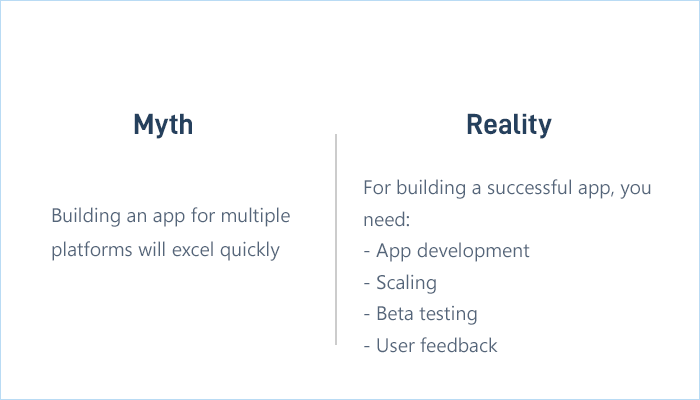
The primary step is to jot down all the necessary app features, embed them in the app, and release the app for the beta testing. Once all the bugs and glitches are taken down, you can proceed further to make your app flawless or maybe add more functionalities.
Myth 13: Building an Enterprise App is a Long and Complex Procedure
Conventional tactics and the process of mobile app development take a lot of time. It takes almost six months to launch a new app to the App Store. Multiply the same figure by the number of apps needed for a business and an app technique seems to be an arduous task even before arranging it.
Many creative and recent processes like rapid app building and feature-driven app building have allowed unique app deployment and development, thus, declining the common myth of a lengthy app building procedure.
Rapid app development is known for offering rapid results, and it is primarily objected to offering a development procedure with the help of development methods. It in turns improves the efficiency of the whole app development process.
The latest cross-platform development processes also help in reducing the app development time by helping developers build mobile apps that are designed to be used on various mobile platforms.
The latest app development platforms enable the developers to use any programming language and decrease the learning curve sharply. You can speed up app development using platforms like Xamarin, which allows the developer to code various app parts only once and use the code on diversified platforms again.
Furthermore, the ready-to-use and easy-to-use cloud-based solutions like Nessus, SOASTA CloudTest, etc. have made developers’ lives easy for testing, hosting, and doing every essential job.
Myth 14. The Work is Done Once the App is Developed
Once the process of app development starts, it involves various facets that require a lot of effort and time. And after everything is placed perfectly, it may seem that the actual work is done. But wait, there is much more that goes into the app.
Once the app is released, comprehensive testing is done to figure out the possible bugs and app’s user-friendliness. Then there is a need to chalk out a well-planned marketing strategy, so that, the target audience is made aware of the app.
After regular intervals, the app is required to infuse the latest features to keep the app up-to-date with its responsiveness and functioning.
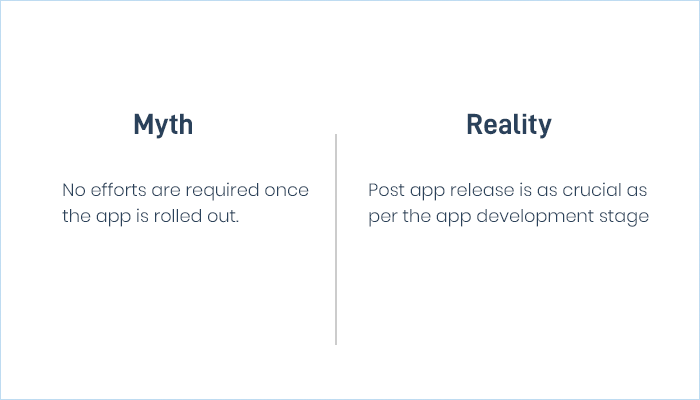
Therefore, it’s crucial to take care of the app even after its release. It would be better if you create a list of new tasks, which need to be completed after the app release.
Myth 15. Developing a Mobile App is Expensive
Developing a mobile app does require money, but it significantly depends upon the features that you wish to embed in the app. Therefore, the more features you wish, the more money you need to invest. But for a simple app with basic functionalities, it won’t cost much.
Following are the factors that drive the cost of an app:
- Number of features;
- Platforms compatibility;
- The complexity of the design and animations;
- Type of the app development team and more.
In general, the app complexity also matters a lot and depending upon the same, it is divided into three categories:
- Elementary Apps: It includes basic functionality that takes around 600 hours and the minimum app development cost stands to be $20,000 (approx.).
- A Bit Complex Apps: It includes customized UI/UX, real-time chart, payment feature, and more. The app cost starts from $50,000 and takes 600-800 hours.
- High Tech Apps: Such apps have advanced functionality like custom animation, real-time synchronization, and more. The app cost starts from $60,000 and can jump further.
Myth 16. You can Easily Find an App Development Company
The first step in the direction of getting an app developed is to find out a team of developers that can help you with the development process right from scratch. Therefore, it’s crucial that you pick a team of professionals who possess the required skill set to develop an app.
With millions of app developers available in the market, it becomes a task to pick 2-3 skillful guys that can get your work done. Thus, it’s imperative that you hire the best mobile app development company.
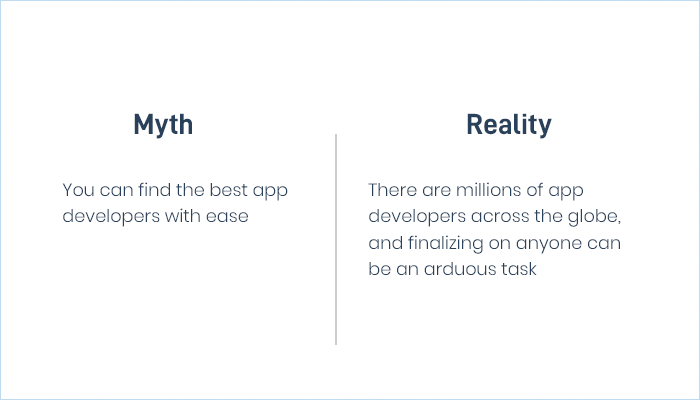
To pick an app developer or a team of app developers, make sure to lay down your requirements well before that; it will help you filter the best developer as per the need. Check out this workflow that you need to follow:
- Define your requirements like experience required, the required platform, familiarity with specific technologies and more.
- Lookout for freelancers, social networks, app developers communities and refer your friends as well.
- Compare the portfolio, experience, and expertise of all the top candidates.
- Take a call with them and make them understand your needs.
Quick Recap of the Top Myths of Mobile App Development
- An idea can drive your dream of having an app.
- App development is about coding only.
- App development process is easy.
- ASO will do the trick.
- Once the app is downloaded, it will be used extensively.
- App with excellent graphics receive the highest user ratings.
- App marketing is just a waste.
- App marketing requires loads of money.
- An app website is better than an app.
- App Analytic Data shows you the true picture of the app performance.
- An app can be better by stuffing more and more features.
- Enterprise app development process is complex.
- Cross-Platform app development is like duck soup.
- You need not worry once the app is rolled out.
- App development process is expensive.
- Everyone is a professional app developer.
The Right Way To Develop A Mobile App
After discussing the points mentioned above, we can conclude that these are the popular myths about mobile application development, which many people mostly believe. However, if you want to achieve success, you must not believe in these myths. Instead, concentrate on proven or examined processes for mobile app development.
So, it’s important not to get interrupted by mobile app development myths like these and follow the right mobile app development practices to stay on track. In case you are seeking an app for your business, just get in touch with a renowned mobile app development company that has many years of experience in serving the mobile industry.







